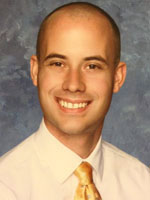In Focus: William Chlystun
Tell us about your background and how you knew you wanted to be a teacher.
History was always something that interested me. I loved learning about the wars and politics that shaped our world. I always thought of teaching as something separate. As a student, I always liked volunteering to help a teacher with grading, putting up bulletin boards, and organizing a classroom, but it wasn’t until I got to college that realized I could put the two together. I enjoy working with students and find that many times they can teach you just as much as you teach them. I like teaching secondary education because I feel it enables a teacher to dive a bit deeper into topics and to challenge students preconceived notions. I have had the unique opportunity to work with students of varying socioeconomic status, cultural backgrounds, and learning levels. Regardless of where you may end up teaching, literacy is one of the main challenges that any educator will encounter. There is never a dull moment in a classroom and if you are committed to the field of education, I find that it can be extremely rewarding.
What brought you to Hofstra University for graduate studies?
When I began to consider my options for graduate school I was trying to find a program that would be a good fit for me as a Social Studies teacher, and appeal to hiring administrators in a world driven by Common Core literacy standards. Hofstra’s location was convenient to both my teaching job in NYC and my home on Long Island. I was able to find all of this with the added benefit of a strong reputation as a teaching school at Hofstra University.
Did you find mentors while you studied at Hofstra?
All of the teachers in the Literacy Studies program have been extremely helpful. I find their mastery of the subject to be top-notch and overall they are very easy to work with. I am a full-time teacher in NYC so sometimes balancing classes with work and a commute can be nightmarish, but they have made every effort to assist me in any way possible. I have never been treated like a burden and I have always felt that the professors genuinely cared about my success. To highlight one person as a mentor would be unfair because I have learned so much from all of them. The department as a whole does a great job of staying on the same page and getting along, which makes it that much easier being a student in the program.
What advice do you have for those seeking certification in Literacy Studies?
Literacy Studies will continue to be a growing field because now all teachers, whether in the field of math, science, English, or social studies, are teachers of literacy first and foremost. I think regardless of your background, teaching literacy is one of the greatest challenges that teachers face. The literacy field is so broad that I think there is something for everyone whether it is early education, secondary education, or bilingual education that interests you.



